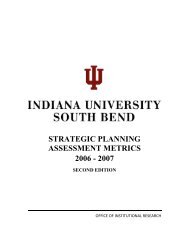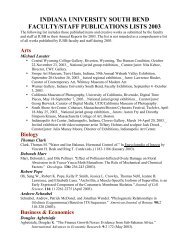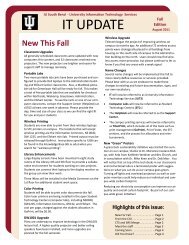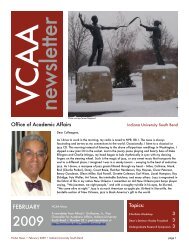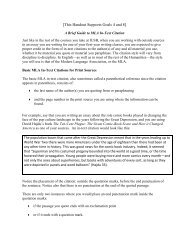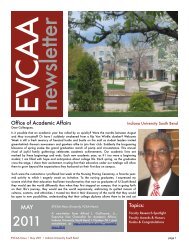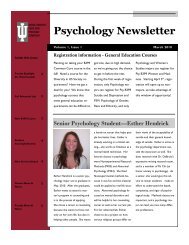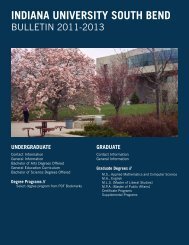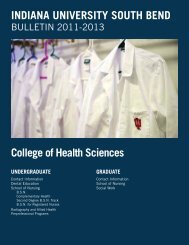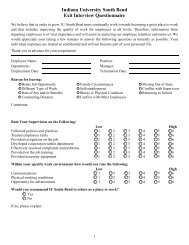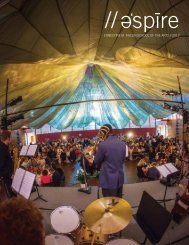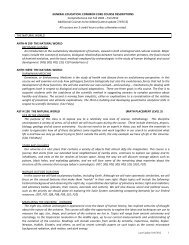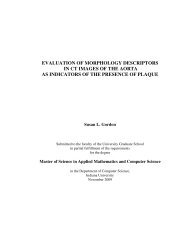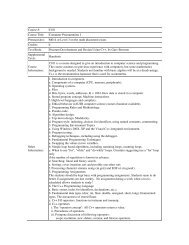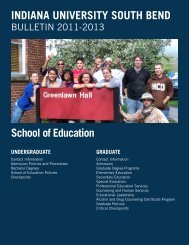Current version - Indiana University South Bend
Current version - Indiana University South Bend
Current version - Indiana University South Bend
You also want an ePaper? Increase the reach of your titles
YUMPU automatically turns print PDFs into web optimized ePapers that Google loves.
3523 IU SOUTH BEND COURSE DESCRIPTIONS<br />
LSTU-L 495<br />
LSTU-L 499<br />
DIRECTED LABOR STUDY (1-6 cr.)<br />
By arrangement. A contract course to<br />
suit the varied needs and interests of<br />
individual participants. The contract with<br />
the faculty member might include reading,<br />
directed application of prior course work,<br />
tutorials, or internship. Competencies are<br />
assessed through written papers, projects,<br />
reports, or interviews. May be repeated<br />
for a maximum of 6 credit hours.<br />
Self-Acquired Competency in Labor<br />
Studies (1-15 cr.)<br />
LTAM: Latin American/Latino Studies<br />
LTAM-L 400<br />
LTAM-L 425<br />
MATH: Mathematics<br />
math-a 100<br />
MATH-K 300<br />
Contemporary Mexico (3 cr.)<br />
P: Junior or senior standing. Seminar.<br />
Interdisciplinary survey of the people,<br />
politics, economics, society, and culture.<br />
Special Topics in Latin American<br />
Studies (3 cr.)<br />
P: Senior standing. Intensive study and<br />
analysis of selected Latin American<br />
problems within an interdisciplinary format.<br />
Topics vary but ordinarily cut across fields,<br />
regions, and periods. May be repeated up to<br />
a maximum of 6 credit hours.<br />
fundamentals of algebra (4 cr.)<br />
P: Mathematics placement examination<br />
Level 2. Designed to provide algebraic skills<br />
needed for future mathematics courses.<br />
Integers, rational and real numbers,<br />
exponents, decimals, polynomials,<br />
equations, word problems, factoring,<br />
roots and radicals, quadratic equations,<br />
graphing, linear equations in more than<br />
one variable, and inequalities. May not be<br />
used to fulfill the quantitative reasoning<br />
requirement for general education. I, II, S<br />
Statistical Techniques for Health<br />
Professions (3 cr.)<br />
P: MATH-M 14 or Level 3 on mathematics<br />
placement examination. R: MATH-M<br />
125. Course introduces nursing/health<br />
science students to the basic concepts<br />
and techniques of data analysis needed<br />
in professional health care practice.<br />
Measurements, data analysis, and<br />
statistics are examined. Differences in<br />
types of qualitative data and methods of<br />
interpretation are explored. Procedures of<br />
estimation and hypothesis testing are also<br />
studied. Emphasis is on the application of<br />
fundamental concepts to real situations<br />
in client care. Credit given for only one of<br />
MATH-K 300 and MATH-K 310. I<br />
MATH-K 310<br />
Statistical Techniques (3 cr.)<br />
P: MATH-M 115, MATH-M 125, or Level 5<br />
on mathematics placement examination.<br />
An introduction to probability and statistics.<br />
Elementary probability theory, conditional<br />
probability, independence, random<br />
variables, discrete probability distributions,<br />
binomial, Poisson and hypergeometric<br />
distributions, continuous probability<br />
distributions, normal and t-distributions,<br />
measures of central tendency and dispersion,<br />
central limit theorem. Concepts of statistical<br />
inference, estimation, hypothesis testing,<br />
regression, tolerancint, quality control.<br />
Special topics discussed may include time<br />
series, analysis of variance, nonparametric<br />
methods, statistical decision theory,<br />
Bayesian inference. Credit given for only one<br />
of MATH-K 300 and MATH-K 310. II<br />
MATH-M 4 Introduction to algebra (3 cr.)<br />
P: Level 1 on the mathematics placement<br />
examination. Designed for remediation<br />
of advanced arithmetic and beginning<br />
algebra skills. Arithmetic of fractions and<br />
signed numbers. Beginning equations in<br />
one variable. S/F grading. Credit may not<br />
be used toward a degree. I, II, S<br />
MATH-M 14<br />
MATH-M 107<br />
MATH-M 108<br />
Basic Algebra (3-4 cr.)<br />
P: MATH-M 4 or Level 2 on the<br />
mathematics placement examination.<br />
Designed to provide algebraic skills needed<br />
for future mathematics courses. Algebraic<br />
fractions, exponents, linear equations,<br />
quadratic equations, inequalities, factoring,<br />
elementary graphs. S/F grading. Credit<br />
may not be used toward a degree. I, II, S<br />
college algebra (3 cr.)<br />
P: MATH-M 14 or equivalent, or Level 3<br />
on mathematics placement examination.<br />
Designed to provide algebraic concepts<br />
and skills including sets of real numbers,<br />
exponents, complex fractions, linear<br />
and quadratic equations, rectangular<br />
coordinates, polynomial and rational<br />
expressions, complex numbers, and<br />
The Fundamental Theorem of Algebra.<br />
Does not satisfy liberal arts and sciences<br />
general-education requirement. I, II, S<br />
quantitative reasoning (3 cr.)<br />
P: MATH-M 14 or Level 3 on mathematics<br />
placement examination. Number sense,<br />
operations, mathematical relationships,<br />
functions, data interpretation, geometry,<br />
measurement, reasoning. Emphasis<br />
on building conceptual understanding<br />
and developing problem-solving skills.<br />
Does not satisfy liberal arts and sciences<br />
general education requirements.<br />
P = Prerequisite, R = Recommended, C = Concomitant, VT = Variable Title<br />
I = fall semester, II = spring semester, S = summer session(s)



